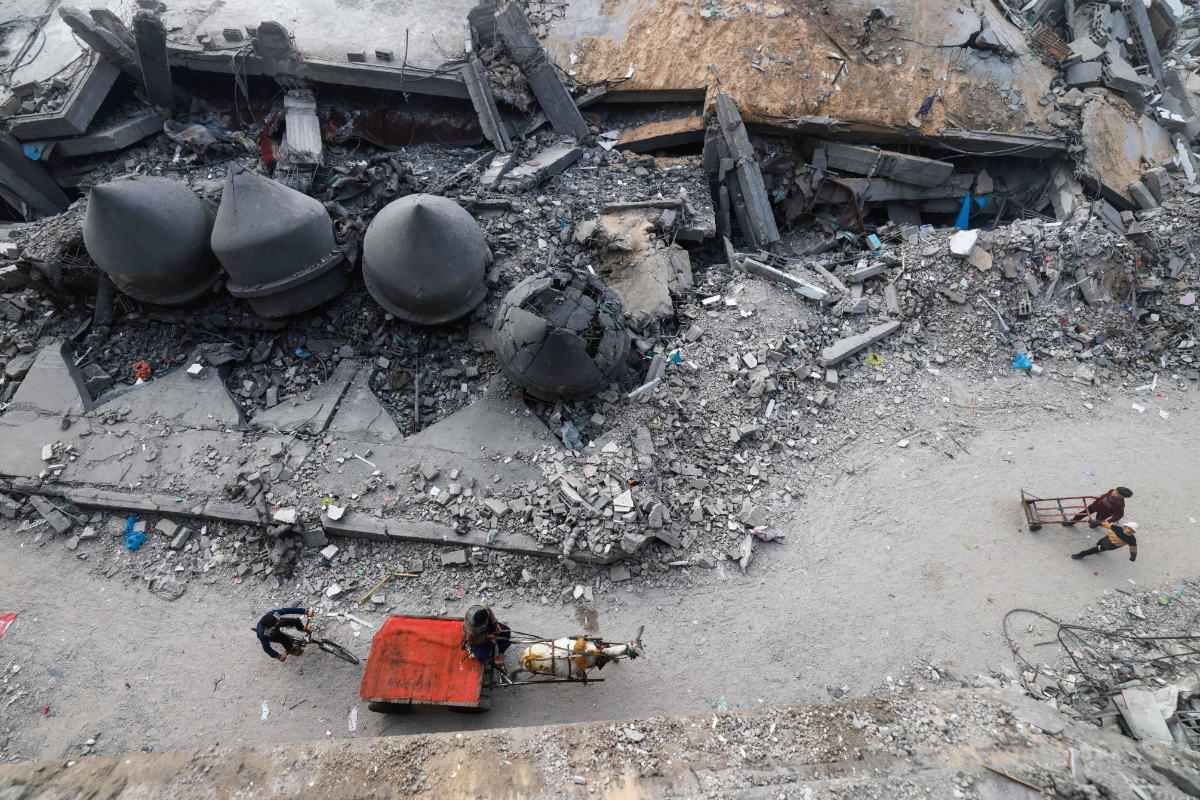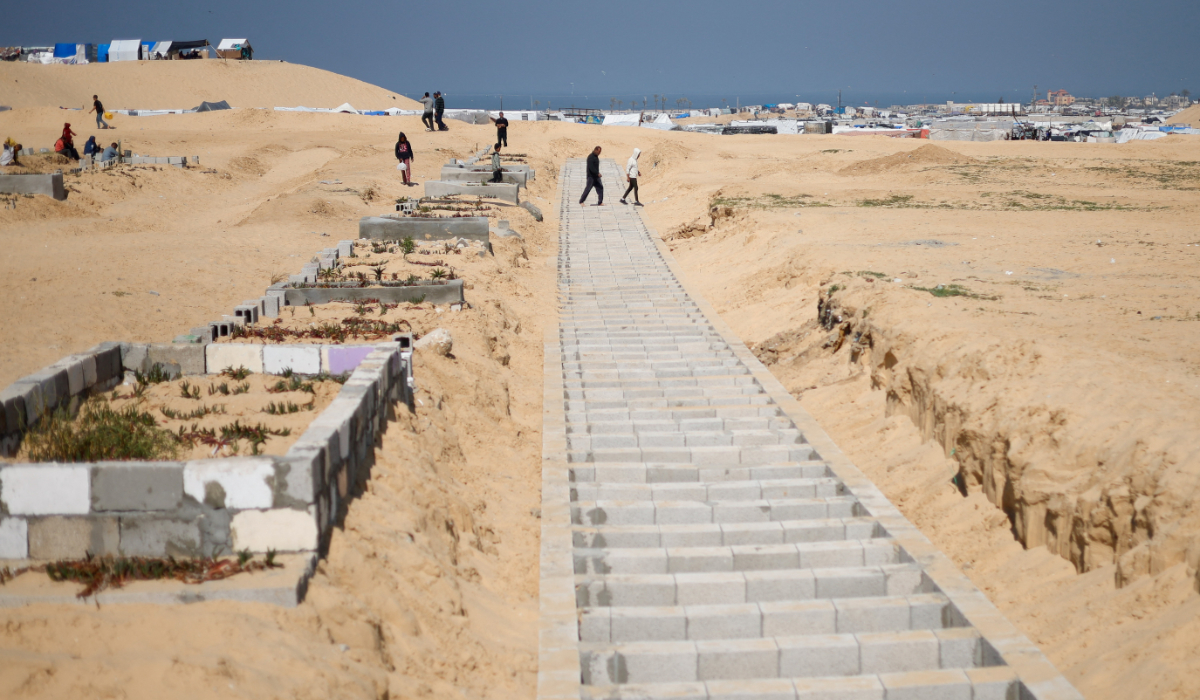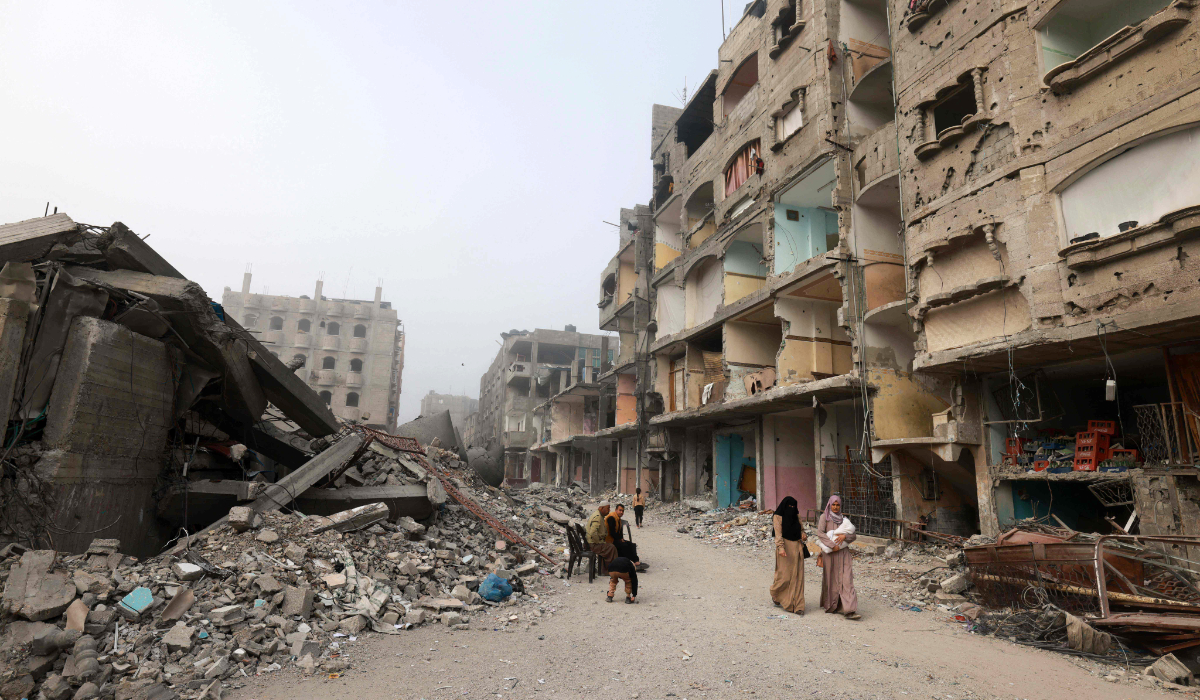RAFAH, Gaza Strip: Israel has failed to comply with an order by the United Nations’ top court to provide urgently needed aid to desperate people in the Gaza Strip, Human Rights Watch said Monday, a month after a landmark ruling in The Hague ordered Israel to moderate its war.
In a preliminary response to a South African petition accusing Israel of genocide, the UN’s top court ordered Israel to do all it can to prevent death, destruction and any acts of genocide in the tiny Palestinian enclave. It stopped short of ordering an end to the military offensive that has triggered a humanitarian catastrophe.
Israel denies the charges against it, saying it is fighting in self-defense.

A donkey-pulled car passes in front of the Al-Faruq mosque, levelled by Israeli bombardment in Rafah in the southern Gaza Strip on a foggy day on February 25, 2024, amid continuing battles between Israel and the Palestinian militant group Hamas. (AFP)
Nearly five months into the war, preparations are underway for Israel to expand its ground operation into Rafah, Gaza’s southernmost town along the border with Egypt, where 1.4 million Palestinians have sought safety.
Early Monday, Israeli Prime Minister Benjamin Netanyahu’s office said the army had presented to the War Cabinet its operational plan for Rafah as well as plans to evacuate civilians from the battle zones. It gave no further details.
The situation in Rafah has sparked global concern. Israel’s allies have warned that it must protect civilians in its battle against the Hamas militant group.

Palestinians visit a cemetery, amid the ongoing conflict between Israel and the Palestinian Islamist group Hamas, in Rafah in the southern Gaza Strip, February 26, 2024. (REUTERS)
Also Monday, Palestinian Prime Minister Mohammed Shtayyeh submitted his government’s resignation, and President Mahmoud Abbas is expected to appoint technocrats in line with US demands for internal reform. The US has called for a revitalized Palestinian Authority to govern postwar Gaza ahead of eventual statehood — a scenario rejected by Israel.
In its Jan. 26 ruling, the International Court of Justice ordered Israel to follow six provisional measures, including taking “immediate and effective measures to enable the provision of urgently needed basic services and humanitarian assistance” to Gaza.
Israel also must submit a report on what it is doing to adhere to the measures within a month. The Israeli Foreign Ministry said late Monday that it has filed such a report. It declined to share it or discuss its contents.

People walk in front of the Al-Faruk mosque, levelled by Israeli bombardment in Rafah in the southern Gaza Strip on February 25, 2024, amid continuing battles between Israel and the Palestinian militant group Hamas. (AFP)
Israel said 245 trucks of aid entered Gaza on Sunday. That’s less than half the amount that entered daily before the war.
Human Rights Watch, citing UN figures, noted a 30 percent drop in the daily average number of aid trucks entering Gaza in the weeks following the court’s ruling. It said that between Jan. 27 and Feb. 21, the daily average of trucks entering was 93, compared to 147 trucks a day in the three weeks before the ruling. The daily average dropped to 57, between Feb. 9 and 21, the figures showed.
The rights group said Israel was not adequately facilitating fuel deliveries to hard-hit northern Gaza and blamed Israel for blocking aid from reaching the north, where the World Food Program said last week it was forced to suspend aid deliveries.
“The Israeli government has simply ignored the court’s ruling, and in some ways even intensified its repression,” said Omar Shakir, Israel and Palestine director at Human Rights Watch.
The Association of International Development Agencies, a coalition of over 70 humanitarian organizations working in Gaza and the West Bank, said almost no aid had reached areas in Gaza north of Rafah since the court’s ruling.
Israel denies it is restricting the entry of aid and has instead blamed humanitarian organizations operating in Gaza, saying large aid shipments sit idle on the Palestinian side of the main crossing. The UN says it can’t always reach the crossing because it is at times too dangerous.
In some cases, crowds of desperate Palestinians have surrounded delivery trucks and stripped them of supplies. The UN has called on Israel to open more crossings, including in the north, and to improve the process.
Netanyahu’s office said that the War Cabinet had approved a plan to deliver humanitarian aid safely into Gaza in a way that would “prevent the cases of looting.” It did not disclose further details.
The war, launched after Hamas-led militants rampaged across southern Israel, killing 1,200 people, mostly civilians, and taking roughly 250 people hostage, has caused vast devastation in Gaza.
Nearly 30,000 people have been killed in Gaza, two-thirds of them women and children, according to the Gaza Health Ministry which does not distinguish in its count between fighters and noncombatants. Israel says it has killed 10,000 militants, without providing evidence.
Fighting has flattened large swaths of Gaza’s urban landscape, displacing about 80 percent of the territory’s 2.3 million people, who have crammed into increasingly smaller spaces looking for elusive safety.
The crisis has pushed a quarter of the population toward starvation and raised fears of imminent famine, especially in the northern part of Gaza, the first focus of Israel’s ground invasion. Starving residents have been forced to eat animal fodder and search for food in demolished buildings.
“I wish death for the children because I cannot get them bread. I cannot feed them. I cannot feed my own children!” Naim Abouseido yelled as he waited for aid in Gaza City. “What did we do to deserve this?”
Bushra Khalidi with UK aid organization Oxfam told The Associated Press that it had verified reports that children have died of starvation in the north in recent weeks, which she said indicated aid was not being scaled up despite the court ruling.
Aid groups say deliveries also continue to be hobbled by security issues. The French aid groups Médecins du Monde and Doctors Without Borders each said that their facilities were struck by Israeli forces in the weeks following the court order.



























